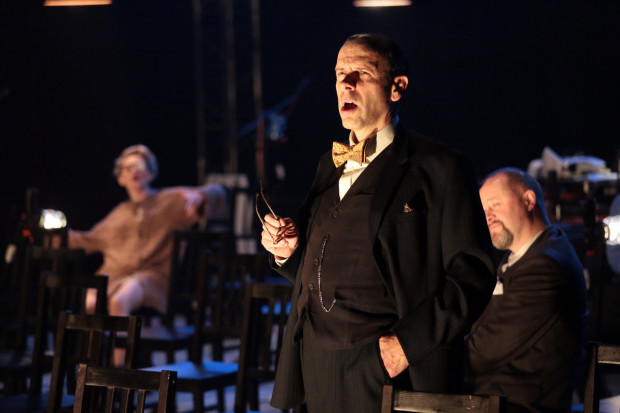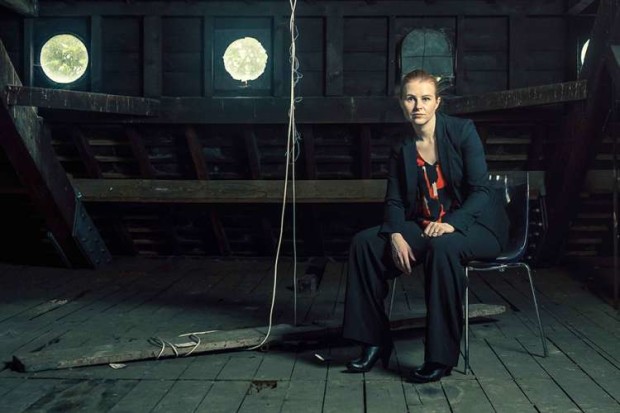You have no items in your cart. Want to get some nice things?
Go shoppingAs ever, this year’s Fringe is proving a hotbed for dramatic innovation, with shows ranging from charmingly off-the-wall to joltingly original. I caught some of the most hotly-anticipated theatre of 2016, and although some of them were clearly more successful than others, all of them in their own way are pushing boundaries.
A Tale of Two Cities: Blood for Blood (Pleasance Courtyard – Beyond)

Jonathan Holloway’s mission statement for his latest project – a collaboration between his own Red Shift Productions and the Hong Kong-based Chung Ying Theatre – was to “disrupt traditional notions of what adaptation actually is,” as he revealed in a recent interview with The New Current. It seems to have worked: A Tale of Two Cities is nothing like your expectations of a Dickens adaptation. Instead of mid-Victorian realism, Holloway’s modernised staging is profoundly theatrical and often non-naturalistic, completely transforming the tone of Dickens’ much-loved novel.
Dickens’ characteristically vast and convoluted plotting hardly makes his novels ripe for adaptation, and Jill Santoriello’s shot at a musical version of the Tale in 2007 was widely criticised for squeezing the bare bones of Dickens’ narrative into the show rather than selectively fleshing-out certain elements, ending up as a less-good version of Les Mis. Holloway has wisely chosen to take some liberties with his source material and cut down the plot to its powerful bare essentials: Sidney Carton’s (Graeme Rose) all-consuming love for Lucie Manette, and Madame Defarge’s (Nicki Hobday) obsessive revenge on the Evrémonde bloodline for the accidental death of her child.
It’s an incredibly powerful drama, not least due to an elemental performance from Hobday as a Defarge in thrall to life-defining hatred, and an unusually dignified portrayal of Carton the reprobate lawyer from Rose. Sarah Llewellyn’s haunting vocal score, sung by the cast at intervals throughout the narrative, gives the sense of powerful forces at work – love, revenge, and civil unrest – unstoppably driving events down a devastating path.
Part of the joy of this production is quite how theatrical it is. The set, consisting of eighty empty chairs adorned with pairs of shoes, casts Holloway’s French revolution as a cloak-and-dagger affair where opponents are picked off and murdered, about as far from the rousing populism of Les Mis as you can get. It’s also much closer to Dickens’ fear of civil uprising, and our modern, jaded view of revolution. Everywhere there have been efforts to soften Dickens’ caricatures and give the play a darker, more reflective tone. Soliloquies, rather than delivered candidly to the audience, are spoken through the microphones lining the sides of the stage like eerie, public announcements. The way the chairs restrict actors’ movements (none of whom ever leave the stage) gives the proceedings a hauntingly static feel, giving the sense of an ominous and oppressive menace rather than a storyline propelled by the agency of its characters.
Holloway’s focus is not so much how to represent Dickens’ tale on the stage, but how he can utilise all of the theatrical techniques at his disposal to expand upon the raw material of Dicken’s plot. Hence the large role played by Llewellyn’s music, Neil Irish’s stage design and a thoughtfully-created atmosphere that can only be brought to life in front of a live audience. It’s a masterclass in literary adaptation, and a more powerful and emotional experience than I’ve ever had reading a Dicken’s novel. Holloway delivers a timely reminder on how to convert an initially unpromising source text into an exciting theatrical event.
A Tale of Two Cities: Blood for Blood has performances on Aug 18-23 and 25-28.
No Horizon (Underbelly Med Quad – Cow Barn)
Back in July, Richard Jordan lamented in The Stage how ever since the ’80s original British musicals have been drowned out by jukebox shows, leaving us far behind Broadway who are still riding a Hamilton-shaped high. According to Jordan, ever since Miss Saigon missed out on an Olivier thanks to rock-and-roll compilation show Return to the Forbidden Planet, the few isolated British musical successes have been overshadowed by a stream of second-rate jukebox affairs. Compulsively marketed as “the Yorkshire Les Mis“ based on a comment by Chris Evans, could No Horizon begin to prove Jordan wrong?
The musical started life as a community project in Penistone written by head-teacher Andy Platt with a cast of local amateurs, but the show has ambitions for a national tour following its Fringe run. It tells the true story of Nicholas Saunderson, an exceptionally gifted, blind Yorkshireman who became a Cambridge professor. This proves to be perfect musical fodder, and Platt milks his source material’s emotion for all it’s worth.
Musically it’s a play of two halves. The opening section in Yorkshire is earnestly declamatory, with strangely upbeat instrumentation that clashes with Nicholas’s hardships. The only half-decent tune is the title song, and even this is beset by the overuse of repetition that’s problematic elsewhere in the score. As the tale moves to Cambridge, the music develops a sense of fun and a more modern feel, with some catchy song-and-dance numbers about intellectually-challenged students and boring lecturers.
The Edinburgh run feels like its demonstrating the musical’s potential rather than trying to show us the finished product: the only set is a projected backdrop and there’s no live music. The cast all have decent but not outstanding voices, though Samuel Reid presses all the right buttons as the determined Saunderson.
It predictably falls some way short of being Yorkshire’s answer to Les Mis, but the two musicals are alike in terms of their broad emotional strokes and rousing themes. Whilst perhaps not destined for the West End, No Horizon is a decent modern musical that isn’t built around the back catalogue of a has-been band. It’s in no way an answer to Hamilton, but the quality is surprising coming from a completely unknown writer and a semi-professional cast – perhaps a sign that we’ve still got it.
No Horizon continues until Aug 27.
Poena X51, or How I Came to Agree With Right-Wing Thinking (Underbelly Med Quad – Ermintrude)

Expectation can reasonably be high for the premier of Abbie Spallen’s new political thriller after the writer won the $150,000 Windham-Campell prize earlier this year. Poena X51 is a one-woman show, a monologue nervously delivered from a lectern by a scientist forced to account for her actions. It’s certainly a fine exploration of loneliness, a running theme in Spallen’s output, but it doesn’t quite hold up as a political thriller.
Bryony Adams has spent 10 years researching a “humanitarian” chemical punishment called Poena to counter prison overcrowding, and predictably the powers that be have less than savoury designs for the formula, leading Byrony to take drastic action. The play attempts to paint its protagonist as a naïve, lefty idealist, but this is quite hard to believe when she’s spent her life researching excruciating ways to punish criminals. Cathy Conneff’s intentionally-stilted delivery is great at conveying a lonely and emotionally repressed professional under pressure, but aside from the honest account of her social isolation (some of the play’s best writing), Bryony is very difficult to care about.
The premise is also difficult to invest in. Poena in its original state seems near-useless as either deterrent or agent of rehabilitation – just as nasty as A Clockwork Orange’s Ludovico treatment without any of the apparent benefits – so quite why it’s portrayed as a genius punishment is anyone’s guess. This is coupled with frustrating plotting where lengthy build-ups to any narrative development are more frustrating than suspenseful. There are plenty of attempts to create tension by Tarik O’Regan’s fashionably-jittery score, but the slight plot seems a bit of an anti-climax to the way it’s handled.
Some serious moral issues were clearly meant to be at play, and in the wake of ever-increasing terror attacks the lengths governments will go to keep their citizens safe is a pertinent issue, as is the long overdue need for prison reform. The questions Spallen asks are probing, but the performance’s unsatisfactory and often irrelevant answers confuse the ethical dilemmas at work. It’s certainly an interesting play, but not a loveable one.
Poena 5X1 has remaining performances from Aug 18-29.
Agent of Influence: The Secret Life of Pamela More (Udderbelly Cowgate – White Belly)
Another one woman show, Agent of Influence is much easier to like than Poena X51, mostly because its protagonist Lady Pamela More is utterly hilarious. Lady Pamela began life as a segment in Sarah Sigal’s 2014 play World Enough and Time, a piece exploring feminism across the ages which debuted to mixed reviews. Now Sigal has granted Pamela a play of her own, and frees her of the burden of making an important feminist statement.
Rebecca Dunn reprises her role as Pamela, and the audience are immediately in thrall to her indomitable personality and hilarious narration – quite why you’d want her to share the stage with anyone else is inconceivable. The setting is 1930s London, and fashion columnist Lady Pamela becomes tangled in an MI5 intelligence operation on the potential leaking of national secrets by Wallis Simpson, mistress to King Edward VIII. The atmosphere is clinched by the otherwise slightly grotty space at Underbelly Cowgate, which comes complete with corrugated iron roofing very much resembling an air raid shelter.
What follows is a good, old-fashioned wartime thriller, told with cheerful snobbery and much high-jinx by Lady Pamela. FBI documents only surfaced as late as 2002 revealing that Simpson was under suspicion of passing military information to her former lover, Joachim von Ribbentrop, the German foreign minister, so some revisionist history is long overdue. Despite keeping the tone light, the play captures a murky political landscape with Nazi sympathisers at the heart of British politics, a very different story than the more romanticised slant we’re often given on King Edward’s abdication. Wallis and Edward’s story has often been given screen-time: in 2010’s Oscar-winning The King’s Speech and Madonna’s less-acclaimed 2011 effort W.E. Both have been charged with distorting history, with The Guardian’s Mark Kermode calling the latter “revisionist balderdash [which] makes an earnest plea for the deification of a stinking rich parasite who coveted someone else’s wife and was on genial terms with Hitler”. Agent of Influence sticks closer to the truth, as well as being significantly better than both films.
Agent of Influence is a monologue that thrives off pure narrative in a very different way to a lot of the one-woman shows I’ve seen in Edinburgh, and it’s also the most unaffectedly entertaining. It’s comedic writing of a very high standard, and explodes some historical myths to boot.
Agent of Influence continues until Aug 28.
The Inevitable Heartbreak of Gavin Plimsole (Pleasance Dome – 10 Dome)
It sounds like a fascinating concept: a show controlled by the monitored heartbeats of its audience. SharkLegs Theatre’s latest production is certainly clever, but it walks a thin line between gimmicky and inspired. Thematically, the links between the proverbial heart and the muscle in our chest, between heartbreak and heart disease, is all very satisfying. The audience participation element, on the other hand, can often feel like the kind of branching-path books some of us loved as a kid, filled with pointless decision-making which doesn’t justify itself thematically.
Gavin Plimsole (Rhys Lawton), still moping after a messy break-up, is diagnosed with a heart condition which sends him spinning into an existential crisis. Not so much a narrative as a nebulous mix of wacky sketches, life advice and heart-based factoids, the tone is most often set to quirky and irreverent despite the possibility of Plimsole’s imminent demise. In its slightly twee attempt to find the meaning of life, there are actually some good insights, like “living in the moment makes you completely impotent: you don’t affect anything and nothing affects you”.
The show’s major selling point is of course the projection of the audience’s heart rates onto the stage, but the ways the play tries to develop this idea don’t quite work. Members of the audience with certain heart rates can control Gavin’s fate, but the decisions all seem rather pointless (choices between a sketch where Gavin tells his parents about his diagnosis or confronts God for example) and only seem to be there for the purpose of audience interaction rather than as an integral part of the play’s message.
A better example of how an audience can influence the outcome of a play at this year’s Fringe would be GMO: Genetically Modified Organism, in which the audience are the jury in a case of whether to execute an illegally genetically-modified four year-old. That play forces us to weigh the issues at hand and come to a conclusion, rather than decide which sketch would be more amusing if we have a certain heart rate.
Gavin Plimsole is a clever play with a unique visual style, but it is not a model for how best to incorporate audience participation into straight(ish) theatre. It’s charming in an oddball sort of way, but something of a dead end when it comes to dramatic invention.
The Inevitable Heartbreak of Gavin Plimsole continues until Aug 29.

About Simon Fearn
Simon is a student at Durham University and aspiring theatre critic. He has reviewed at the Edinburgh Fringe with EdFringeReview and is Stage Editor for Durham's student newspaper, Palatinate. He has also written music reviews for W!zard Radio and Cuckoo Review.




